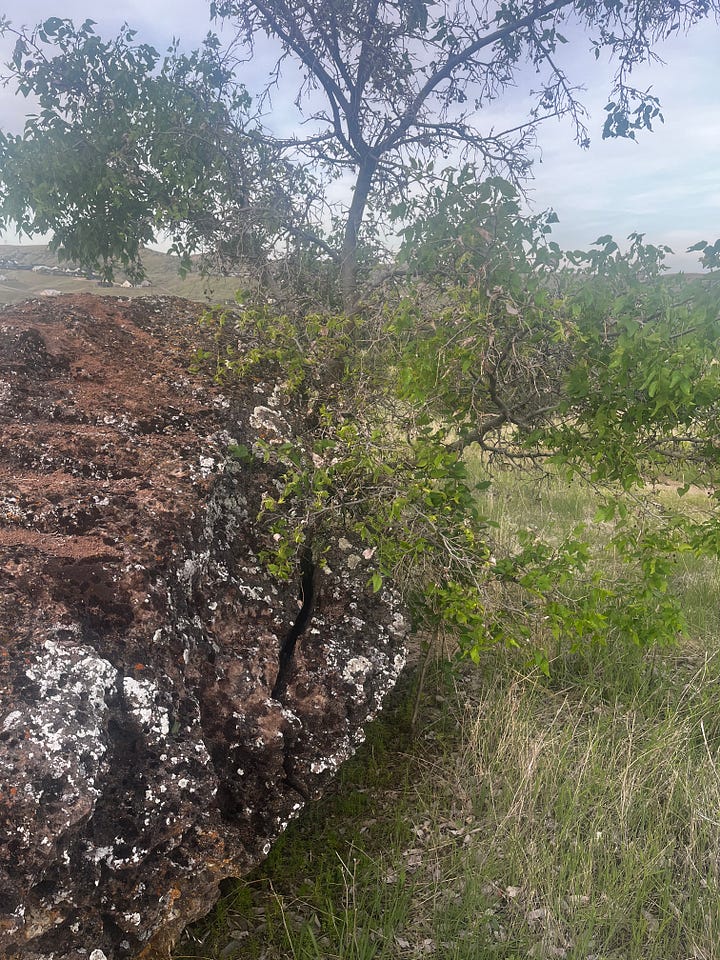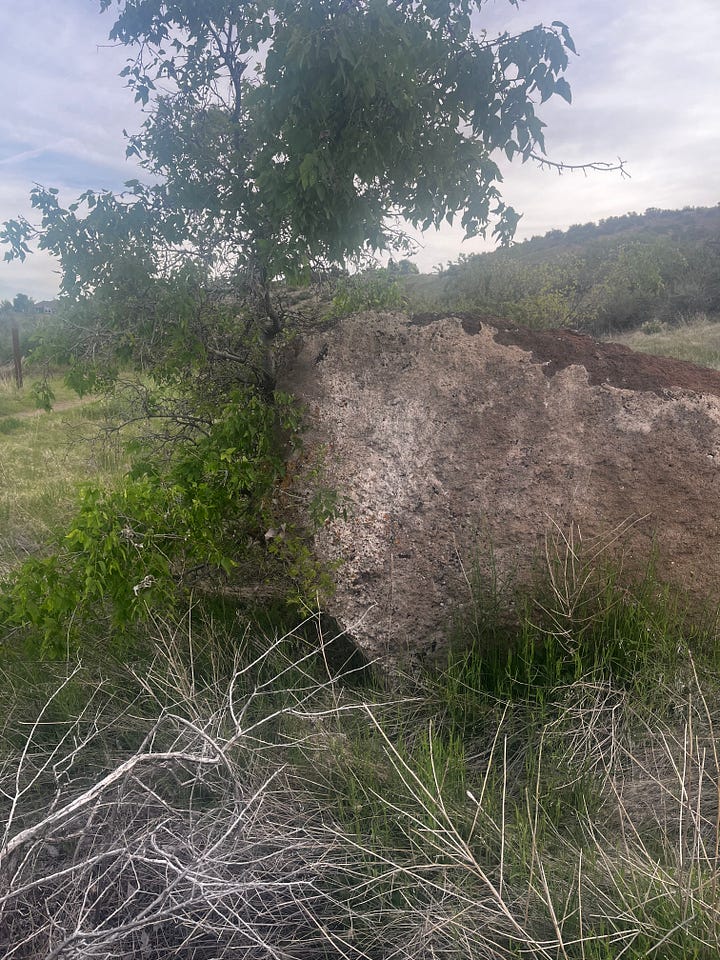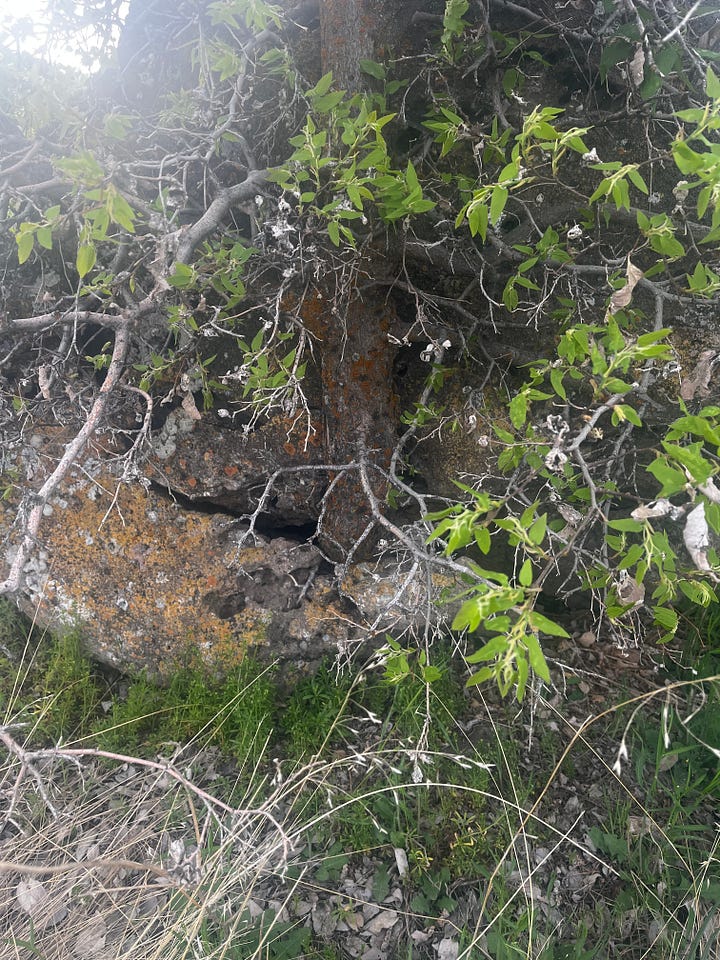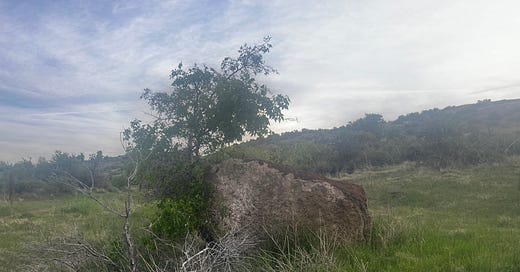There is a large network of maintained trails just a few minutes from my house, and as the days are getting longer and the weather drier, it’s hiking season! The two main trails I walk are easy to access and just the right length. They both cut along the side of a foothill. I’ve walked these trails hundreds of times over the years. On my first hike of the season, something, which has always been there, caught my eye.
Do you see it?
This is a Common Hackberry tree growing out of this large volcanic rock. I’ve walked past this many times, but I was stunned and curious and wanted to know more this time. I paused, examined it from different angles, and pondered how this tree grew in a very inhospitable environment.




This week, my “cardio” (Car + audiobook = cardio) was Notes On An Anxious Planet by Matt Haig. (I loved it and highly recommend it.) Matt writes an imaginary interview with Sea Turtles in one thoughtful and wise essay. I loved how the turtle's wisdom and experience suddenly became relevant and meaningful, and a new perspective on the human condition emerged.
The turtle interview came to mind when I saw the tree growing out of the rock. It made me wonder what the tree and the rock might say. Would they have a story to share? Would they have insightful wisdom?
I interviewed the tree. I didn’t sit on the grass at the base of the rock and tree (I did think about it, but... ticks). I’ve been holding an imaginary conversation in my head for the past several days with the tree (and the rock, he wouldn’t be silent once I started talking with the tree…it turns out the rock had a story to tell too).
Here is what I learned from my ongoing interview with the Common Hackberry (I think) tree growing out of a rock.
I thought she had grown out of the rock when I saw the tree. However, I learned from talking with her that the story was longer and involved more elements than I had ever considered. She told me her ancestors started growing through the cracks, and each generation would make it just a little further and farther. She said earthquakes and at least one dinosaur tail helped in the process. (We went FAR back; the rocks and trees (or tree ancestors) have been here that long.
She told me about the changes she’s seen: more noise (cars, flying things, people hiking and riding bikes playing music!), fewer birds, fewer small animals, fewer large animals too, but more people. She said when she was younger, humans would pick her berries and harvest her leaves, but humans tend not to see her (or the grasses around her) as much as they used to. It makes her feel lonely.
When I asked for her advice, she said:
“Finally, I’ve been waiting years for someone to stop and ask me…well, all these questions.
Humans, why do you go so fast? Slow down!
This hill you walk daily is filled with stories stretching back longer than you can imagine…
We have much to share if you would slow down.
Secondly, I would say to follow the nourishment.
I’m here, in this rock, because my ancestors didn’t try to overpower the rock, they just found where the light broke through, where water dripped in, and they followed the pathway which was there, they didn’t try to grow through rock that wasn’t ready for them..I’m not a product of overpowering, and overconsumption, I’m a product of yielding, following the light, growing in the cracks, not creating the cracks..(but of course, sometimes the growing in the cracks did create cracks, but never, ever in my DNA did we try to grow towards anything but the space where we could grow, there light and water slipped through)”
The rock wanted his say, too, his advice for humans:
“Slow down, quiet down, and settle down. The humans that used to come moved slower, appreciated more, saw more, and partnered with us more. We, the tree and I, are here, in this place. We don’t move about, but we see, we feel, and we know more than you might think.”
St. Ignatius wrote about the power of imaginative prayer. Terrance Klein wrote in America: The Jesuit Review. “Ignatius insists that the Holy Spirit can use the imagination as something of a scalpel for the soul. So often, the meditations that the saint asks us to make begin with the words, “Imagine that…” or “See yourself…” Ignatius entreats us to picture things differently because things change when we look at them in a new way.”
My ongoing, imaginative conversation with a tree growing out of rock has felt whimsical, fun, meaningful, and instructive. It has caused me to see things differently.
I’m looking around my backyard and neighborhood walks and wondering, what would that tree tell me? What would the owls have to say? Would the beaver busily downing trees have any advice to share? What notes do the ordinary robins, trees, and rocks have for us living on a “nervous planet,” as Matt Haig calls it?
I think they all have more to say if we listen.
A Blessing For Imaginative Interviews
See that bird, tree, flower, river, ordinary native plants growing up around you, sharing space with you; they have stories to share. When you feel brave, silly, and imaginative, may you ask what story they have to share. Ask bold questions, listen for surprising answers. May you slow down, settle down, and listen to the stories around you. And may those stories root you deeper in the place where you live, breathe, and have your being.
I loved this exercise. It was so fun to imagine what the tree might say. It was meditative, creative, and fun! I wrote pages of interview questions and responses. There is something freeing about asking and answering questions.
You can too…try it this week?
(If you would like to read my full interview with the tree (and rock), I would happily email it to you. Send me a message, and I’ll send it over!)
I’m sharing a few quotes from Matt Haig in Notes on a Nervous Planet. I found his creativity, insight, and honesty powerful. Read the following passages slowly, notice what speaks to your soul, and listen for the invitation to be playful, imaginative, and fun this week.
This is part of another imaginative essay, from the beach to a beachgoer…(Whew, I think it’s powerful…I hope you will too!)
“A Note From the Beach
Hello. I am the beach. I am created by waves and currents. I am made of eroded rocks. I exist next to the sea. I have been around for millions of years. I was around at the dawn of life itself. And I have to tell you something. I don’t care about your body. I am a beach. I literally don’t give a fuck. I am entirely indifferent to your body mass index. I am not impressed that your abdominal muscles are visible to the naked eye. I am oblivious. You are one of 200,000 generations of human beings. I have seen them all. I will see all the generations that come after you, too. It won’t be as many. I’m sorry. I hear the whispers the sea tells me. (The sea hates you. The poisoners. That’s what it calls you. A bit melodramatic, I know. But that’s the sea for you. All drama.) And I have to tell you something else. Even the other people on the beach don’t care about your body. They don’t. They are staring at the sea, or they are obsessed with their own appearance. And if they are thinking about you, why do you care? Why do you humans worry so much about a stranger’s opinion? Why don’t you do what I do? Let it wash all over you. Allow yourself just to be as you are. Just be. Just beach.”
Matt Haig in Notes on a Nervous Planet
“But while choice is infinite, our lives have time spans. We can’t live every life. We can’t watch every film or read every book or visit every single place on this sweet earth. Rather than being blocked by it, we need to edit the choice in front of us. We need to find out what is good for us, and leave the rest. We don’t need another world. Everything we need is here, if we give up thinking we need everything.”
― Matt Haig, Notes on a Nervous Planet
“Progress,' wrote C.S. Lewis, 'means getting nearer to the place you want to be. And if you have taken a wrong turning, then to go forward does not get you any nearer.' This is a phenomenally good way of looking at it, I think. Forward momentum, on an individual or social level, is not automatically good simply because it is forward momentum. Sometimes we push our lives in the wrong direction. If we feel it is making ourselves unhappy, progress might mean doing an about-turn and walking back to the right road. But we must never feel - personally or s a culture, that only one version of the future is inevitable.
The future is ours to shape.”
― Matt Haig, Notes on a Nervous Planet









Thanks for this lovely wisdom. I always look forward to your posts!
This is so beautiful and such a creative way with engaging more deeply in God's creation. Thank you for sharing!